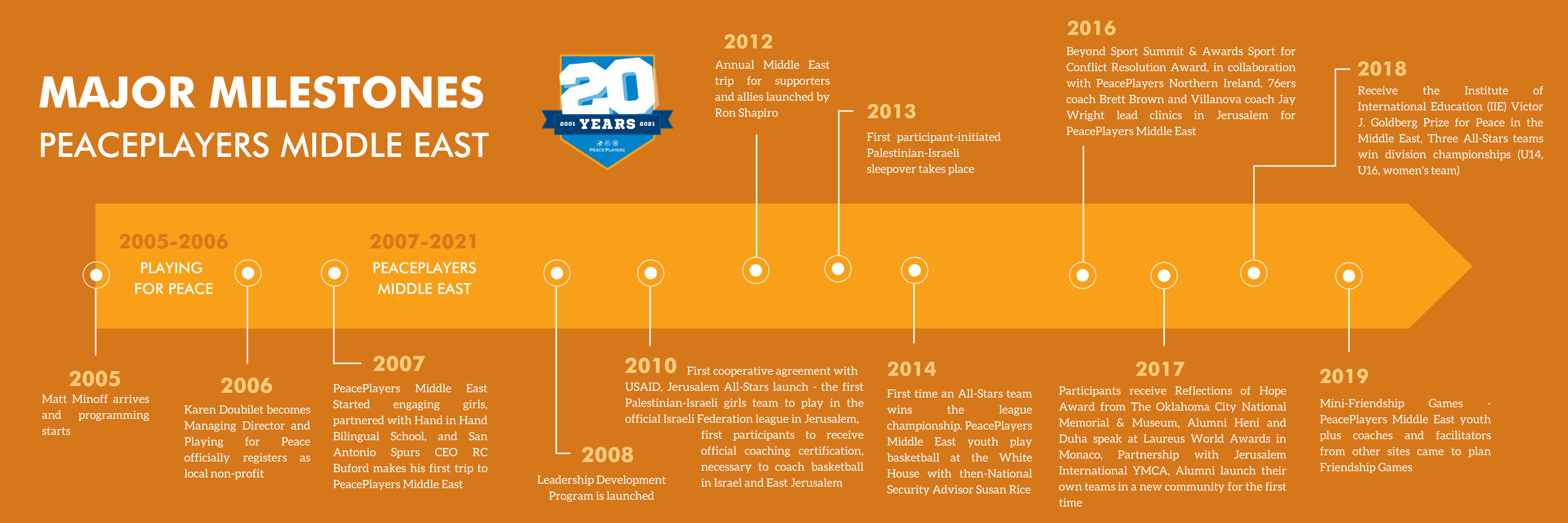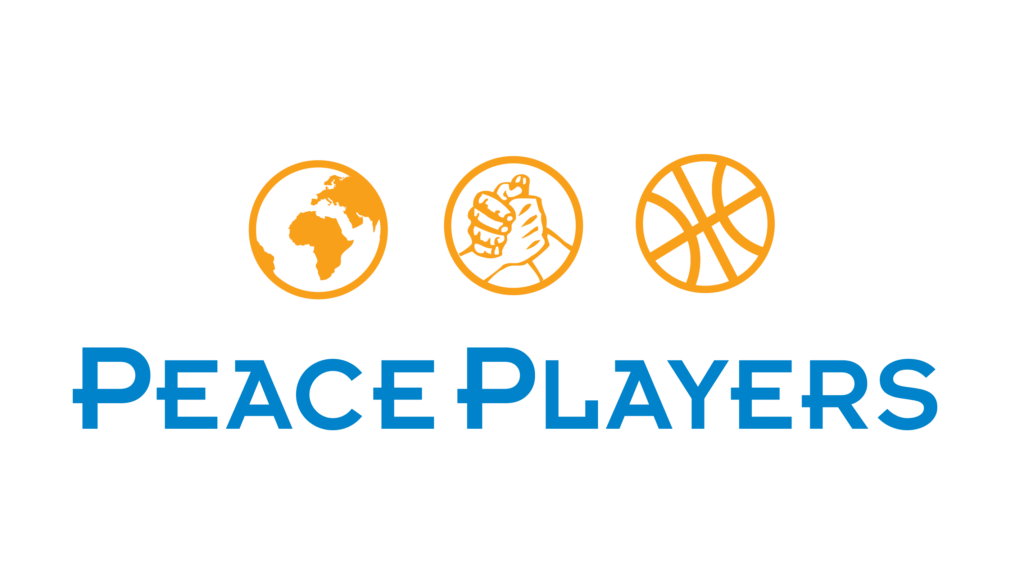The Serendipitous Beginnings of PeacePlayers Middle East
August 23, 2021
SHARE
Serendipity is the word you would use to describe those early beginnings at PeacePlayers Middle East. There certainly hadn’t been any plans to branch out to one of the most intractable conflicts of the past century. But the opportunity just presented itself — and if there was one thing that PeacePlayers co-founders Sean and Brendan Tuohey didn’t do in those years, it’s pass on an intriguing opportunity, no matter how daunting.
It all started in 2005 with Matt Minoff, a recent graduate and player at Yale who had just accepted a fellowship position at PeacePlayers South Africa. Matt was practically packed and ready to head down to Durban when he received an interesting proposition – to play basketball professionally in Israel. Matt jumped at the opportunity, and after he arrived, he thought that maybe what was already working in South Africa and Northern Ireland also could work among Israelis and Palestinians. Could basketball be a powerful enough tool to achieve what decades of peace talks had not?
When Matt arrived in Israel, Israelis and Palestinians were just coming out of the Second Intifada, a half decade when thousands of Palestinians and Israelis had been killed in terrorist attacks and military incursions. Many of the very youth recruited to PeacePlayers had been present at a terrorist attack, or had lost someone to the violence – so fear and animosity were at an all time high. Bringing Israelis and Palestinian together seemed like an impossible task.
But soon after Matt arrived, Sean joined him and the two began to do just that, hosting basketball summer camps for Palestinians and Israeli kids. Brendan Tuohey, PeacePlayers Co-Founder and President, recalls the first camp at Wingate, Israel’s premier sports education institution, where 100 Palestinian and Israeli children came together to play basketball:
“We walk in on the first day, and no one really wanted to be there. The kids didn’t even know why they were there. It was really tough, but by the end of the week, you had kids playing on mixed teams, rooting for each other. And the last, the champion game, I still remember the scene and the kid’s name, Ido, hits a hit a three at the buzzer to win, and everyone's storms the court, and you see Israeli and Palestinian kids celebrating together. I had some great conversations with the coaches that worked at the camp and that gave us both the confidence that, hey we can do this here, but also the awareness of how hard it would be.”
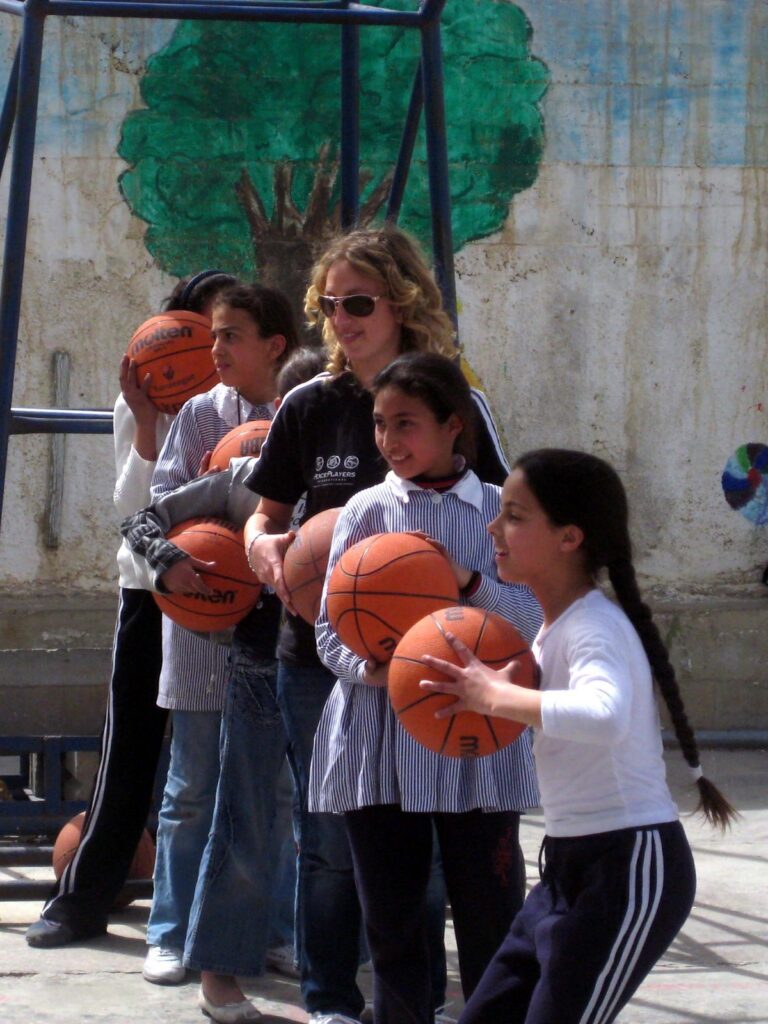
To make the seemingly impossible possible, Matt looked for local partnerships, people who could help him carry out this vision of bringing Palestinians and Israelis together through basketball. “He just went out there like an entrepreneur does and knocked on doors and was like, who’s in charge of sports in this community or who plays basketball?” says Karen Doubilet, PeacePlayers’ Middle East’s first Managing Director and current Executive Director.
Matt’s search for partners also brought him the the Peres Center for Peace, a non-profit started by the late Israeli statesman Shimon Peres. The Peres Center had been using soccer to bridge divides between Israelis and Palestinians and the nascent PeacePlayers Middle East teamed up with the veteran organization for a number of shared activities in an effort to get its own programming off the ground. Although that partnership was short-lived, through the Peres Center, Matt met Karen, who had been doing research on the impact of intergroup encounters.
“Matt was really interested in impact. He was interested in building a curriculum. He also recognized that they needed some expertise in peace education and conflict mitigation.”
Karen made an impression because after Matt finished his playing contract and headed back to the U.S., he named Karen, a 28-year old with no managerial experience nor athletic background, to take over the program
Year of the Girl
When Karen became Managing Director of PeacePlayers Middle East, it had been led by men, and served only boys. But this didn’t deter Karen, even though looking back, she thinks that maybe it should have. “I think everyone else noticed way more than I did that I was the only woman and I didn’t have a sports background. Looking back, it’s funny because it should have been an issue. When I came on, the way some of the men would talk to me or the way they responded to me, I understood that it was an issue for them. I just always looked at it as their defect, not mine.”
When Karen first joined, the program was still exclusively male. As a program launched by American men who did their best to understand the local landscape but perhaps didn’t grasp all of the nuances, there was uncertainty around how receptive Palestinain and Israeli girls – and more importantly their families – would react to the prospect of basketball.
“Because they were aware that many of the communities we’re working with are a bit more patriarchal than in the States. And so and a lot of the communities we were working with are conservative and religious. So they just didn't think there'd be a demand and they didn't think there'd be acceptance from the community.”
Nonetheless, at that point, circa 2007, PeacePlayers had already put engaging girls in the Middle East on their to-do list. At PeacePlayers’ head office, in Washington, DC, they were already searching for women fellows to ease the recruitment of girls and women coaches. In the meantime, the team on the ground in the Middle East decided to do an experiment. “We decided that we were going to go try and do another recruiting day in East Jerusalem and sort of see what happened.” Brian Sigafoos the 7-ft tall PeacePlayers Middle East fellow went to Esawiah, a gritty, traditional Palestinian neighborhood at the foothills of the Hebrew University at Mount Scopus where there were frequent clashes with Israeli law enforcement. The PeacePlayers team were skeptical that any girls would show up, but with that entrepreneurial spirit, they said “Hey, let’s try it.”
So, Brian went to the outdoor court in Esawiah with two balls in hand, and was shocked to find 80 girls eagerly waiting to play.
“The girls don't have anything to do. The boys actually had some activities, or at least they could go outside to play soccer. It wasn't accepted for the girls to go out and play on their own on the streets, and it became clear that there is a huge demand. I remember we declared it the year of the girl. We were going to try and do it."
That demand, however, didn’t always translate into community support. For girls there there was double resistance, first the issue of girls playing sports, and second the issue of playing with Israelis. At first, it was a
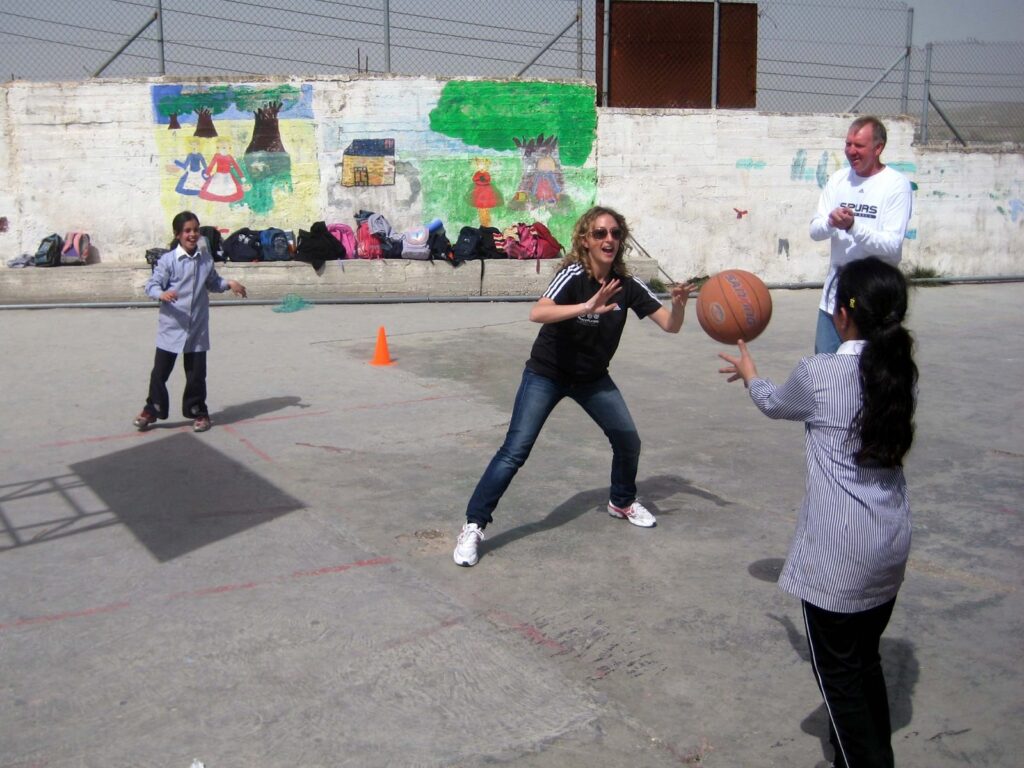
challenge to retain female participation in the long term, — especially as, over time, girls started to grow into women. However, the Middle East team developed relationships and built trust with families, and it got easier. “[The parents know PeacePlayers. They see the benefit that it has on their child.” Not long after that, PeacePlayers Middle East was more than fifty percent girls.
From American Import to homegrown
Karen soon recognized the need to elevate local staff, people who understood the language and culture. Without those tools it was difficult for American PeacePlayers staff to assess if a partner’s intentions were pure, if they could be trusted. “So, some people are in it for the wrong reasons,” says Karen Doubilet, PeacePlayers’ Middle East’s first Managing Director and current Executive Director. “Not necessarily that they wanted to harm it, but it was a job opportunity.” As a Canadian-Israeli who spoke Hebrew and had been living in Israel since 1997, Karen had a fair lay of the land, but it took people on the ground, in Palestinian and Israeli sports communitites to really complete the equation.
One major part of that equation was a Palestinian coach from East Jerusalm whom Sean had met on the court at Jerusalem’s Bell Park, a popular spot for pickup basketball and a rare space where Palestinains and Israelis in the city occupied the same ground. That meeting would prove to be a key factor in the success and continuity of PeacePlayers Middle East. “Fairly quickly, I saw that he was someone special. He was a person who stood out as someone who really cares about the kids and about the program, and he was kind of the first local [staff] that I developed a relationship with,” says Karen. The more time that went by, the more this coach ended up becoming a partner to Karen in helping to build the program. And through this partnership, this friendship, Karen came to see the dynamic between the staff from a local perspective.
“It's like we were ‘helping the natives’, you know, like that kind of mindset. So you would hear phrases like ‘they've got to step it up’. Stuff like that, that today, I think there's probably a lot more awareness just around kind of microaggressions or cultural differences. I really tried to push for a change in the organization where we put a lot more power into the hands of the locals and have the trust of the community and all those things, and that the American presence was still really important. But they should be there to excite the kids and be role models and bring fun American cool basketball and not, you know, make strategic decisions about the communities that we're working with.”
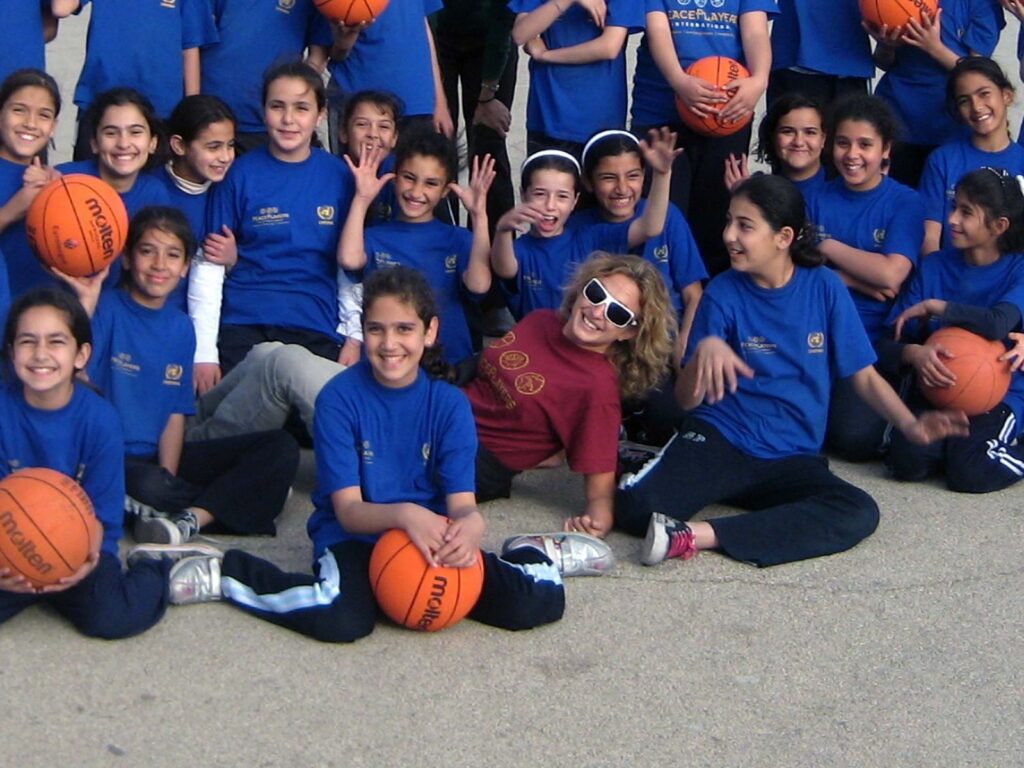
Palestinian-Israeli Partnership Gets a Chance to Win
After a number of years bringing Palestinian and Israeli kids together for twinnings, the team in the Middle East started to feel like something was missing. “If you’re just going for fun and throwing the ball and and every time we come and do the same thing and we don’t grow and develop necessarily as athletes, so kids get bored, move on to something else or look for something more competitive,” says Karen. The Middle East team began to understand that competition was key to their longevity. “That created a framework in which you’re always improving, you’re always moving up in the league, and growing together as a team.” More than just creating an added draw for youth, the All-Stars also served as an accelerator for building friendships between Palestinian and Israeli players. With weekly games, and
practices almost every day, players were coming together and reveling in their shared team identity on a daily basis.
It exposed underresourced Palestinian girls from East Jerusalem to new opportunities for athletic advancement and competitive play. If that weren’t enough, it was also a way to reach the wider public. “People don’t necessarily value the work that we do, so by being a winning team, being a really good team, that’s how you earn the respect and get the attention of the wider community.” And win they did – to date, the PeacePlayers All-Stars have consistently occupied top slots in their divisions, and even won a championship in 2006.
But it was more groundbreaking than just a way to keep kids engaged – the Jerusalem All-Stars were the first Israeli-Palestinian team from Jerusalem to ever play in the Israel Basketball Association’s official league. It exposed underresourced Palestinian girls from East Jerusalem to new opportunities for athletic advancement and competitive play. If that weren’t enough, it was also a way to reach the wider public. “People don’t necessarily value the work that we do, so by being a winning team, being a really good team, that’s how you earn the respect and get the attention of the wider community.” And win they did – to date, the PeacePlayers All-Stars have consistently occupied top slots in their divisions, and since 2006 have won at least one division championship a year.
Hitting the jackpot
Although the Jerusalem All-Stars were definitely one of PeacePlayers’ greatest accomplishments, Karen’s proudest moment is a little smaller and more intimate – the first time a group of Palestinian and Israeli girls from PeacePlayers organized their own sleepover party. Although their communities might border on one another, Palestinians and Israelis live totally separate lives, and home visits across enemy lines is not something that happens.
“I remember [around 2010] somebody was interviewing me and they were talking to [former participants] Khaled and David and they're like, ‘Oh, do you guys ever go to each other's house?’ And I was laughing. And I said to the person, ‘You have to understand the context. There’s no way that will ever happen’. And a couple of years later. They were having slumber parties in each other's houses. To me, that was ‘wow’, we had, you know, hit the jackpot.”
Interested in learning more about the impact PeacePlayers Middle East is having today? PeacePlayers Middle East is celebrating 15 Years! Be sure to follow PeacePlayers Middle East on social media @pp_middle_east.
